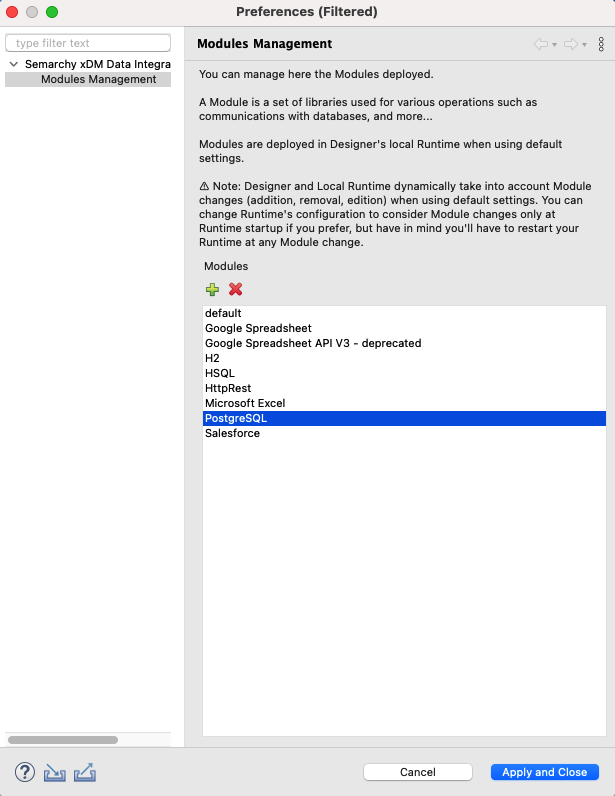| This is documentation for Semarchy xDI 2023.1, which is no longer supported. For more information, see our Global Support and Maintenance Policy. |
Install and Manage Modules
In Semarchy xDI, a module is a set of files that xDI uses to communicate with external technologies such as databases, cloud platforms, and more. A module contains software libraries and files such as JDBC drivers, API libraries, and their software dependencies.
You can have multiple modules for a given technology, but each module has its own unique name. You can reuse a single module for as many metadata objects as you want.
When To Use Modules
Using a module is mandatory to communicate with any technology requiring some libraries for communication. The Semarchy xDI Designer will help you to select and create modules when necessary.
New Metadata
When creating a new metadata, if the related technology requires it, the creation wizard includes a step to select the Module to use. For more details, refer to Create a Metadata.
Existing Metadata
You can change or edit the module used by a metadata object by going to the metadata root node, and modifying the Module property in the Properties view.
The Metadata Modules Manager assigns a module to a set of metadata.
Scripting Process Actions
If a scripting process action requires additional libraries, you can select a module from the action’s Properties view.
Manage modules
You can review and edit modules in the Module Manager.
To access it, go to .

Create modules
To create a new module:
-
Click the
 button. The Module Selection/Creation window opens.
button. The Module Selection/Creation window opens. -
Select a module Type.
-
In the Details panel, add any required libraries by selecting them from the Third Party Pack dropdown, or click the
 to add a new user library from disk.
to add a new user library from disk. -
Click Finish.
Review or edit modules
To review or edit an existing module:
-
Double-click the module name in the Modules list. The Module Selection/Creation window opens.
-
Review the list of libraries in the Details panel.
-
To add a new user library, click the
 button.
button. -
To remove a user library, select it from the Users Files section of the libraries list and click the
 button.
button.
Delete modules
To delete a module: Select it from the modules list of the Module Manager and then click the  button.
button.
Missing libraries
When adding or editing a module, the Module Selection/Creation window shows a message if you need additional software libraries:
Some modules can already get the libraries they need from an installed component. You can find these libraries in the Third Party Pack drop-down list, in the Details panel.
However, some libraries are not available in xDI components for licensing reasons. You must source them from the vendor directly, either from their website, or bundled with the technology itself.
After retrieving a third-party library, add it by clicking the  button in the Details panel.
button in the Details panel.